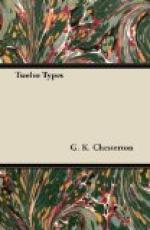Almost all the faces in the portraits of that time look, as it were, like masks put on artificially with the perruque. A strange unreality broods over the period. Distracted as we are with civic mysteries and problems, we can afford to rejoice. Our tears are less desolate than their laughter, our restraints are larger than their liberty.
STEVENSON[A]
A recent incident has finally convinced us that Stevenson was, as we suspected, a great man. We knew from recent books that we have noticed, from the scorn of ‘Ephemera Critica’ and Mr George Moore, that Stevenson had the first essential qualification of a great man: that of being misunderstood by his opponents. But from the book which Messrs Chatto & Windus have issued, in the same binding as Stevenson’s works, ’Robert Louis Stevenson,’ by Mr H. Bellyse Baildon, we learn that he has the other essential qualification, that of being misunderstood by his admirers. Mr Baildon has many interesting things to tell us about Stevenson himself, whom he knew at college. Nor are his criticisms by any means valueless. That upon the plays, especially ‘Beau Austin,’ is remarkably thoughtful and true. But it is a very singular fact, and goes far, as we say, to prove that Stevenson had that unfathomable quality which belongs to the great, that this admiring student of Stevenson can number and marshal all the master’s work and distribute praise and blame with decision and even severity, without ever thinking for a moment of the principles of art and ethics which would have struck us as the very things that Stevenson nearly killed himself to express.
Mr Baildon, for example, is perpetually lecturing Stevenson for his ‘pessimism’; surely a strange charge against the man who has done more than any modern artist to make men ashamed of their shame of life. But he complains that, in ‘The Master of Ballantrae’ and ’Dr Jekyll and Mr Hyde,’ Stevenson gives evil a final victory over good. Now if there was one point that Stevenson more constantly and passionately emphasised than any other it was that we must worship good for its own value and beauty, without any reference whatever to victory or failure in space and time. ‘Whatever we are intended to do,’ he said, ’we are not intended to succeed.’ That the stars in their courses fight against virtue, that humanity is in its nature a forlorn hope, this was the very spirit that through the whole of Stevenson’s work sounded a trumpet to all the brave. The story of Henry Durie is dark enough, but could anyone stand beside the grave of that sodden monomaniac and not respect him? It is strange that men should see sublime inspiration in the ruins of an old church and see none in the ruins of a man.




